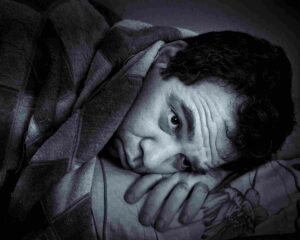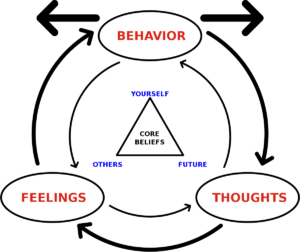What are OCD Dreams? Do you have them? If you don’t know what they are, don’t worry, you are not alone. Many people have never heard of OCD Dreams before and may be wondering what they are. Simply put, OCD Dreams are dreams that involve obsessive-compulsive disorder symptoms. They can vary in content and severity, but all share one common trait: they cause distress or anxiety in the dreamer.
Contents
What Are OCD Dreams?
 OCD dreams are generally understood to be a form of OCD that is characterized by intrusive, unwanted thoughts or images that occur during sleep. People with OCD dreams may have difficulty falling asleep or staying asleep due to the distress caused by the content of their dreams.
OCD dreams are generally understood to be a form of OCD that is characterized by intrusive, unwanted thoughts or images that occur during sleep. People with OCD dreams may have difficulty falling asleep or staying asleep due to the distress caused by the content of their dreams.
The content of these dreams can be related to any number of obsessions and compulsions that a person with OCD may experience during their waking hours. For example, a person with OCD who is obsessed with cleanliness may dream about becoming contaminated by dirt or germs. Alternatively, a person with OCD who is afraid of being hurt may dream about being attacked or harmed in some way.
OCD dreams can be extremely distressing and may lead to sleep disturbance and daytime fatigue. In some cases, they may also be a trigger for OCD symptoms during waking hours. If you are experiencing OCD dreams, it is important to seek professional help in order to address the underlying causes of your disorder.
How To Recognize If You’re Having OCD Dreams?
It can be difficult to identify if you’re having OCD dreams because they often feel very real. However, there are some key signs that can help you determine if your dream is related to your OCD:
- You obsessively think about the dream long after waking up
- The dream feels especially vivid or intense
- The content of the dream revolves around your main OCD fears
- The dream results in anxiety or distress
- You have difficulty returning to sleep after having the dream
These symptoms might not be experienced with every OCD dream, but if you have multiple dreams that include these characteristics, it’s likely that your dreams are related to your OCD. According to studies, up to 70% of people with OCD have reported experiencing dreams that are related to their disorder.
The reason behind this is still unknown, but it’s believed that dreams are connected to a person’s intrusive thoughts. Dreams are often a way for our brain to process information and sort through emotions. Therefore, it makes sense that people with OCD would have dreams that reflect their main concerns and fears.
While OCD dreams can be disruptive and disturbing, there are some things you can do to manage them. You just need to understand what’s happening and find ways to cope with the anxiety that comes along with it.
What Causes OCD Dreams?
 There is no one specific cause of OCD dreams, as they can be triggered by a variety of things. However, some common triggers include:
There is no one specific cause of OCD dreams, as they can be triggered by a variety of things. However, some common triggers include:
Stress
This is one of the most common triggers for OCD dreams. When we’re feeling stressed, our minds are more likely to race and we may have trouble sleeping. This can lead to nightmares or other types of disturbing dreams. In fact, people believe that stress is one of the main reasons why people with OCD tend to have more nightmares than those without the disorder.
Anxiety
Another common trigger for OCD dreams is anxiety. Anxiety can cause us to feel on edge and stressed, which can lead to problems sleeping. And as we know, not getting enough sleep can lead to some pretty strange dreams. For example, you might have a dream about your house being broken into or losing your job. Also, anxiety is believed to cause us to dream more vividly and vividly. Because of this, people with anxiety may be more likely to remember their dreams than people without anxiety.
Medications
Certain medications can also cause OCD dreams. For example, some antidepressants and anti-anxiety medications have been linked to nightmares. If you think your medication is causing you to have OCD dreams, speak to your doctor. They may be able to adjust your dosage or switch you to a different medication.
Trauma
Dreams related to OCD can also be triggered by trauma, such as a car accident or a natural disaster. These dreams may be nightmares, and they can cause a great deal of distress. Often, the content of the dream will be related to the event that triggered it. For example, someone who was in a car accident may have a dream about being in a car that is out of control. Someone who witnessed a natural disaster may have a dream about being trapped in a dangerous situation.
Sadness or failure
 Sadness or failure is often a major trigger for OCD dreams. A person with OCD may dream that they have failed a test or that someone they care about has died. These types of dreams can be extremely distressing and may lead to increased anxiety or avoidance behaviors. This occurs because the dreamer is trying to avoid the potential for future sadness or failure.
Sadness or failure is often a major trigger for OCD dreams. A person with OCD may dream that they have failed a test or that someone they care about has died. These types of dreams can be extremely distressing and may lead to increased anxiety or avoidance behaviors. This occurs because the dreamer is trying to avoid the potential for future sadness or failure.
While everyone has the occasional bad dream, for people with OCD, these dreams can be a nightly occurrence. So these are some possible triggers that can bring on an OCD dream.
When you have OCD, it can be difficult to tell the difference between reality and your dreams. This is because both can be equally as distressing. Therefore, if you are experiencing OCD dreams, it is important to seek treatment from a mental health professional. In this way, you will be able to learn how to distinguish between reality and your dreams. Treatment can also help you manage the anxiety and avoidance behaviors that are associated with OCD dreams.
How Does OCD Dreams Influence Life?
It is believed that individuals with OCD are more likely to experience dreams that are related to their obsessions and compulsions. For example, a person with OCD who is obsessed with germs may dream about being contaminated by dirt or bacteria. A person with OCD who has compulsive hoarding tendencies may dream about losing precious possessions.
Dreams such as these can be extremely distressing and may cause the individual to feel even more anxious and stressed. In some cases, the content of OCD dreams can be so upsetting that it leads to sleep paralysis or night terrors. Some of the common negative impacts of OCD dreams can include:
Decreased sleep
When you are constantly dealing with anxiety-inducing dreams, it can be difficult to get a restful night’s sleep. This can lead to fatigue and further impair your ability to manage symptoms during the day. In fact, it can lead to insomnia, which is one of the most common comorbidities associated with OCD.
Intrusive thoughts during the day
Since the content of your dreams is often related to your obsessions, you may find that you have intrusive thoughts about these topics during the day. This can make it difficult to focus on other tasks and can lead to even more anxiety.
Difficulty concentration
 When you have OCD dreams it can be difficult to concentrate on anything else. Your mind is consumed with the thoughts and images from your dream, making it hard to focus on anything else. This can make it difficult to function at work or school and can impact your relationships. For example, if someone has OCD dreams the whole night, it would be hard for him/her to focus on his/her work the next day.
When you have OCD dreams it can be difficult to concentrate on anything else. Your mind is consumed with the thoughts and images from your dream, making it hard to focus on anything else. This can make it difficult to function at work or school and can impact your relationships. For example, if someone has OCD dreams the whole night, it would be hard for him/her to focus on his/her work the next day.
Physical impacts
It is very common for people with OCD dreams to have physical symptoms as a result of their condition. These can include:
- Nightmares
- Night sweats
- Fatigue
- Irritability
- Muscle tension
- Headaches
All of these physical impacts can make it very difficult for someone to function normally during the day.
Relationship problems
It is obvious for someone with OCD to have relationship problems. The person is not able to think about anything else except intrusive thoughts. This causes a lot of tension and arguments between the couple. One partner may feel neglected and misunderstood. It is hard for the person with OCD to open up and express what they are feeling because they are afraid of being judged.
So, these are some common consequences of having OCD dreams. If you or your loved ones are experiencing any of these, it is important to seek professional help. OCD can be treated with therapy and medication. Do not hesitate to reach out for help if you need it. And also, understand that it is not your fault. OCD is a mental illness that is out of your control. With treatment, you can manage your symptoms and lead a happy and fulfilling life.
How To Treat It?
There are many ways to treat OCD, but not all of them will work for every person. The most common and effective treatments are listed below:
Cognitive Behavioral Therapy (CBT)
 CBT is a form of therapy that helps people to change their thinking patterns and behaviors. This type of therapy has been shown to be very effective in treating OCD. It works by helping people to identify their thoughts and feelings, and then changing the way they think about and respond to them. The major aim of CBT is to help people learn how to control their OCD symptoms. In fact, during the session, a therapist will help the person with OCD face their fears head-on. This will help them to learn how to control their thoughts and behaviors.
CBT is a form of therapy that helps people to change their thinking patterns and behaviors. This type of therapy has been shown to be very effective in treating OCD. It works by helping people to identify their thoughts and feelings, and then changing the way they think about and respond to them. The major aim of CBT is to help people learn how to control their OCD symptoms. In fact, during the session, a therapist will help the person with OCD face their fears head-on. This will help them to learn how to control their thoughts and behaviors.
Exposure and Response Prevention (ERP)
ERP is a type of CBT that helps people to face their fears and learn how to control their reactions to them. This treatment works by gradually exposing people to the things they are afraid of while teaching them how to control their reactions. For example, if someone is afraid of germs, their therapist may have them touch door handles and then wash their hands afterward. The goal is to help people learn that they can control their reactions and eventually stop OCD behaviors.
ERP has been shown to be an effective treatment for OCD, with studies showing that it can help reduce symptoms in as many as 80% of people who try it. So, this type of therapy is widely considered for the treatment of OCD.
Medications
It is often necessary to take medication for OCD. Many people with OCD are resistant to this idea, believing that they can overcome their disorder without the help of drugs. However, medication can be a helpful tool in managing OCD symptoms. There are two main types of medications used to treat OCD:
- Antidepressants
- Anti-anxiety medications
Antidepressants are the most commonly prescribed type of medication for OCD. They are effective in treating the obsessions and compulsions of OCD. These medications work by increasing levels of serotonin in the brain. Serotonin is a neurotransmitter that helps to regulate mood and anxiety.
However, it is important to discuss all the potential things about the medication before starting any type of regimen. Some people have found that medications have helped them to reduce their OCD symptoms, while others have not had the same success.
Self-help strategies
 Even though you are considering professional help but self-help has its own benefits. So, here are some self-help strategies for you to try:
Even though you are considering professional help but self-help has its own benefits. So, here are some self-help strategies for you to try:
- Educate yourself about OCD and how it works: When you know more about your problem, it can be easier to deal with it. Read books or articles, talk to people who have OCD, or look online for information. The more you know, the more empowered you will feel.
- Challenge your OCD thoughts: Once you know how OCD works, you can start to challenge your negative thinking patterns. This is called “cognitive restructuring.” For example, if you are afraid of germs, challenge yourself by touching doorknobs and other objects that may be “contaminated.”
- Expose yourself to your fears: It involves gradually exposing yourself to the things you are afraid of and learning to resist the urge to engage in your compulsions.
- Practice relaxation techniques: Relaxation can help you deal with anxiety and stress. Try deep breathing, progressive muscle relaxation, or meditation.
- Choose a healthy lifestyle: A healthy lifestyle can help reduce stress and anxiety. Exercise regularly, eat a balanced diet, get enough sleep, and avoid drugs and alcohol. It might sound like a lot of work, but it’s worth it!
- Join a support group: There are many online and offline support groups for people with OCD. Connecting with others who understand what you’re going through can be very helpful.
Try some of the self-help strategies listed above and see if they help you get a better night’s sleep. However, do not replace professional help with self-help. If your symptoms are severe, make sure to talk to a mental health professional. They can help you develop a treatment plan that is tailored to your specific needs.
Conclusion
In the bottom line, it is to be said that OCD dreams are not something to be taken lightly. It may not seem like a big deal at first, but it can have a significant impact on your life if left untreated. If you think you might be suffering from this condition, please reach out to a professional for help.
And at first, you need to understand that this is a real problem that many people suffer from. With the right treatment, you can live a normal and fulfilling life. OCD dreams can be extremely disruptive and cause a great deal of distress. However, there are things you can do to ease your symptoms.
For more information and tips, you can contact Therapy Mantra. The team of experts and professionals can help you understand your condition and offer the best possible treatment. In fact, we offer a variety of services around the globe at convenient, affordable, and pocket-friendly prices. So, please do not hesitate to contact us. We are here to help you! You can book an online therapy, or counseling and also download our free OCD treatment app on Android or iOS.


